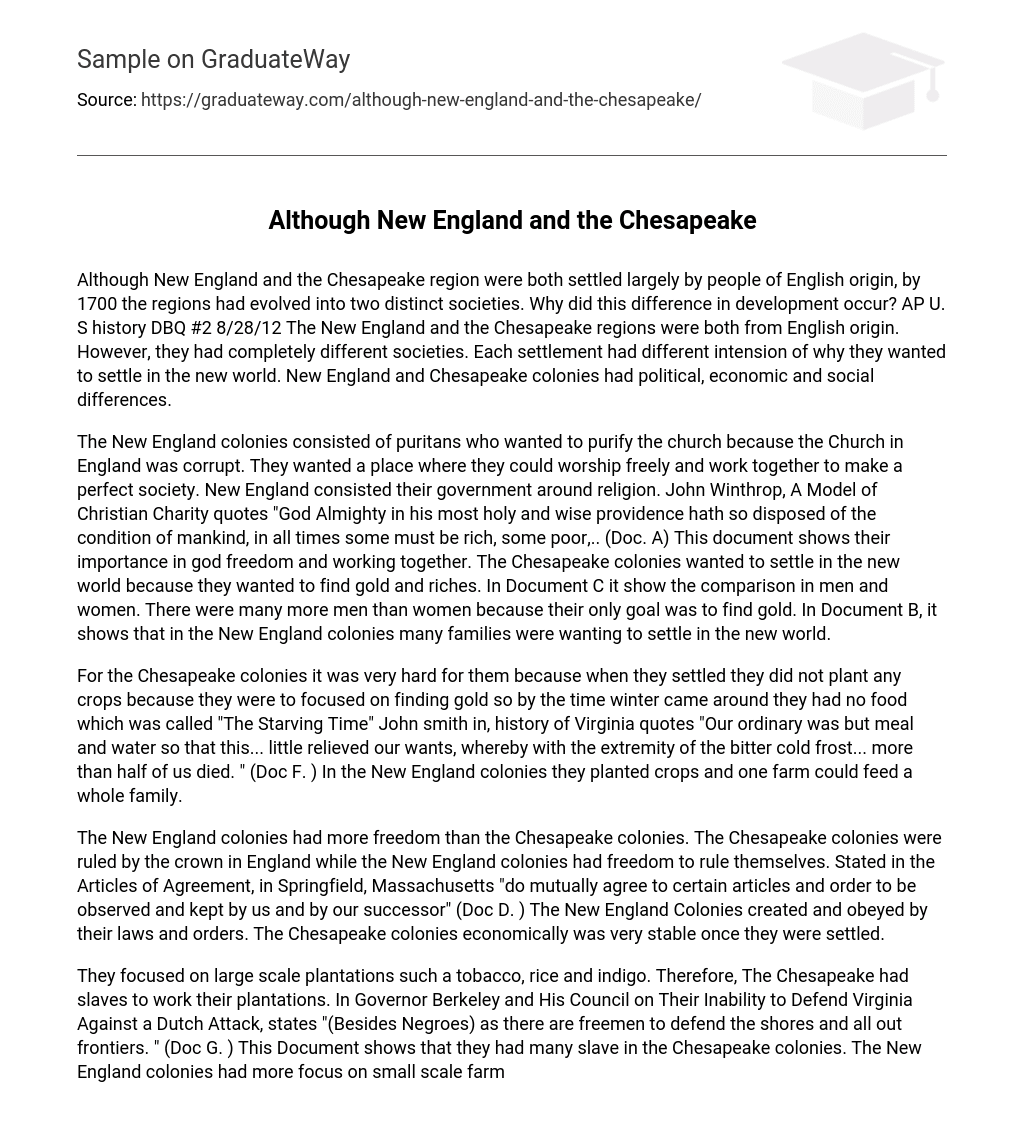By 1700, New England and the Chesapeake region had evolved into distinct societies despite being primarily settled by English immigrants. The divergent motivations behind each settlement’s decision to establish colonies in the New World led to pronounced political, economic, and social differences between the New England and Chesapeake colonies.
The New England colonies consisted of Puritans who aimed to purify the corrupt Church in England, desiring a place where they could worship freely and work together to build an ideal society. Religion formed the basis of their government. John Winthrop’s “A Model of Christian Charity” emphasizes the importance of unity and divine providence in assigning different conditions to individuals. This document reflects their devotion to God, freedom, and communal effort. In contrast, the Chesapeake colonies were motivated by the desire for gold and wealth in the new world. As shown in Document C, there was a significant gender imbalance with more men than women due to their sole focus on finding gold. Document B illustrates the strong yearning of many families in the New England colonies to settle in the new world.
Despite the difficulties faced by the Chesapeake colonies, they neglected to cultivate crops initially due to their obsession with finding gold. As a result, when winter arrived, they experienced a severe shortage of food known as “The Starving Time.” John Smith, in his history of Virginia, claims, “Our ordinary diet consisted only of meal and water, which barely relieved our hunger. Additionally, the extreme cold caused more than half of our population to perish.” On the other hand, the New England colonies prioritized crop cultivation, enabling one farm to provide sustenance for an entire family.
The New England colonies enjoyed greater freedom compared to the Chesapeake colonies. While the Chesapeake colonies were under the rule of the crown in England, the New England colonies were granted self-governance. As indicated in the Articles of Agreement, established in Springfield, Massachusetts, “we mutually agree to certain articles and orders to be observed and upheld by us and our successors.” The New England Colonies established their own laws and regulations which they adhered to. The Chesapeake colonies, on the other hand, achieved economic stability after they were settled.
The Chesapeake colonies concentrated on cultivating large plantations, including crops like tobacco, rice, and indigo. Consequently, they relied on slaves to labor on these plantations. In Governor Berkeley and His Council on Their Inability to Defend Virginia Against a Dutch Attack, it is stated that besides African slaves, there were also freemen available for the defense of the shores and frontiers. This document reveals the prevalence of slavery in the Chesapeake colonies. In contrast, the New England colonies prioritized small-scale agriculture and the production of goods such as lumber, shipbuilding, and whaling.
They did not have many plantation colonies. The New England colonies did not utilize any slave labor. Education in the New England colonies was highly valued as reading the Bible was an integral part of their daily lives. These colonies were pioneers in establishing public educational systems, leading them to have the highest literacy rate globally during that era. Social stability thrived in these colonies as everyone cooperated in constructing their society. The New England colonies held strong religious beliefs, as reflected in John Winthrop’s quote, “We must consider that we shall be as a city upon a hill.”
The quote “The eyes of all people are upon us” suggests the importance of striving for perfection and being aware that God and everyone else is watching. In the Chesapeake colonies, education held little significance with one of the lowest literacy rates. Priority was given to plantations rather than learning. Approximately 75% of the population were indentured servants, and the introduction of slavery further contributed to an aristocratic atmosphere. Due to the rural nature of the Chesapeake colonies, establishing schools and churches proved challenging.
The religion of the colonies was established by the church of England and did not include puritans. The founding principles of each colony were influenced by their climate. These decisions shaped colonies settled by Englishmen of the same ethnicity to become distinct and different societies. The colonies differed due to their reasons for settlement, beliefs, and political freedoms. The shared goal of these colonies was to seek change, whether it be for religious or economic purposes.





